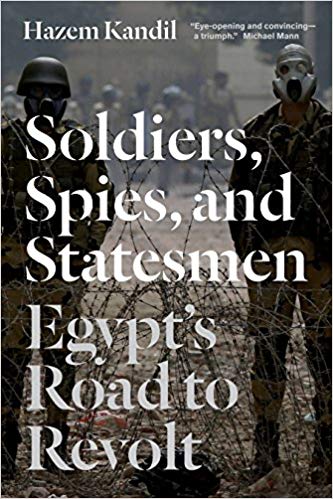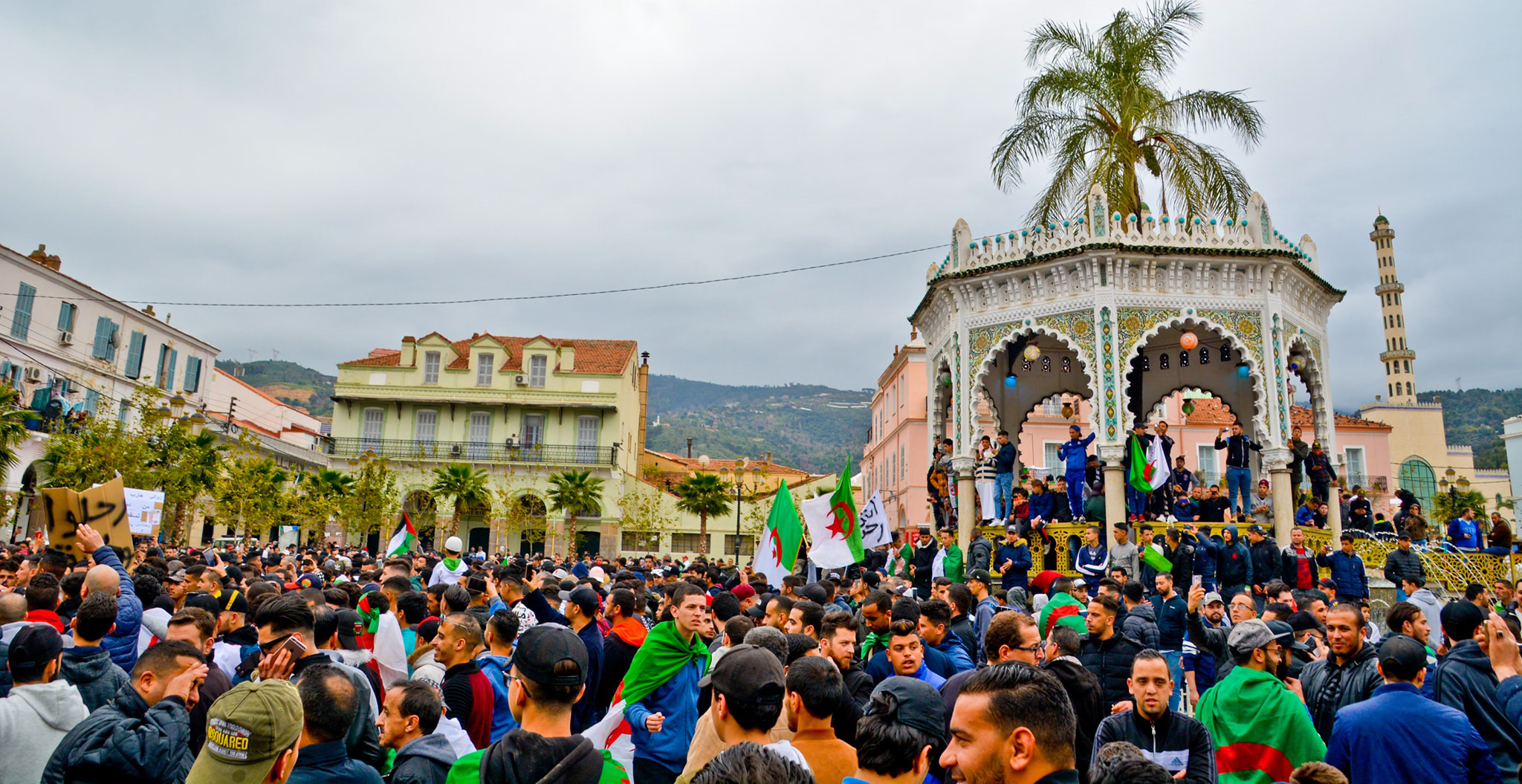As`ad AbuKhalil reviews Middle East rulers’ reasons for distrusting their own militaries.

King Hussein of Jordan among his troops, March 1957. (Wikimedia Commons)
By As`ad AbuKhalil
Special to Consortium News
 A close association between armies and politics has pertained in the Middle East for a long while. Army leaders have led many Arab countries in contemporary times. In Israel, prime ministers are often drawn from the ranks of former generals or commanders. Shimon Peres, for instance, was a director-general of the Israeli Defense Ministry and he played a key role in Israeli acquisition of nuclear weapons through devious and deceptive means that violated international laws and the laws of many countries, including the U.S.
A close association between armies and politics has pertained in the Middle East for a long while. Army leaders have led many Arab countries in contemporary times. In Israel, prime ministers are often drawn from the ranks of former generals or commanders. Shimon Peres, for instance, was a director-general of the Israeli Defense Ministry and he played a key role in Israeli acquisition of nuclear weapons through devious and deceptive means that violated international laws and the laws of many countries, including the U.S.
In Israel, the military has been romanticized and glorified and Israeli chiefs-of-staff are often expected to run for high office as soon as they retire from the military. The public in Israel has always sought leaders who can promise — and deliver — mass violence on the Arab population and the ability to impose Israeli will by force. Israeli top generals exemplified the doctrine of mass violence which served as one of the founding elements of state Zionism.
The Israeli war crimes against the native Palestinian population have created a special place for Israeli military commanders, and has in fact militarized the entire Israeli society. This militarization is seen as heroic here in the U.S. (even liberals swoon when Amos Oz would talk about his role in various Israeli wars), and for Arabs it has made it unfortunately difficult to distinguish between military and civilian targets in Israel, where all adults are expected to serve in the army (non-Druze Arabs are not permitted except in some cases while students of Jewish religious seminaries are exempted from service).
The entry of Arab armies into Arab politics began in earnest after the occupation of Palestine in 1948. Armies launched coups in Egypt, Syria and Iraq (three in Syria in one year alone in 1949, two of which were probably engineered by U.S. intelligence) and often in the name of helping the Palestinians return to their homeland. [For more on this, see Patrick Seale’s “The Struggle for Syria,” and Hugh Wilford’s “America’s Great Game: The CIA’s Secret Arabists and the Making of the Modern Middle East.”]

Jaramana Refugee Camp in Damascus, Syria, established after the “catastrophe” known as Nakba, 1948. (Wikimedia Commons)
‘Palestine’ in Coup Lingo
Coups in Sudan, Libya, and Yemen also invoked the name of Palestine, as did coups that failed, as the Al-Watha’iq Al-Arabiyyah documentary anthology for 1969 and 1970 details. “Palestine” became a word used for political rationalization and legitimization by seekers of political power. All new regimes had to offer a promise or a vague plan for the liberation of Palestine. Syrian President Amin Hafiz, in office during the 1960s, even announced that he was willing to liberate Palestine in a matter of hours.
In the 1950s and 1960s (up until the devastating 1967 defeat), Arabs were made to expect that a battle could erupt any minute now and that it will be the final blow which will bring the Zionist state down. But the 1967 defeat dashed the hopes of the people, and it erased the prestige that Arab people have bestowed —rather unfairly — on Arab armies. Military expenditure was justified in the name of liberating Palestine but the abysmal performances on the battle field exposed the militaries as either tools of corrupt regimes or as instruments of local repression, or often vehicles of Western political machinations and intrigue.
The military has been tainted in Arab politics and rulers don’t trust the military anymore. In the Gulf, the military is an important element of political power but the regimes don’t trust them in the hands of strangers, i.e. commoners. Relatives (usually brothers or half-brothers) of the rulers run the military and intelligence apparatuses. Rulers’ utmost care towards the military apparatus has led them to attain military degrees to project an image of military expertise. This started with King Husayn of Jordan, who attended the U.K.’s Royal Military Academy Sandhurst. After him, most Gulf regimes sent sons and nephews of the rulers to Sandhurst. (Arab royals don’t undergo the regular military degree-issuing program, but special training is arranged for them and presumably for large sums of royal donations).
In Arab republican regimes such as Iraq and Syria, the rulers have also assigned members of the family to key military and intelligence assignments. This was the case under Saddam in Iraq and also under Hafidh Al-Asad, the former president of Syria. It may have been reduced under Bashar, Syria’s current ruler, but only due to the death of his brother-in-law. And Bashar’s brother, Maher, still commands The Fourth Armored Division.
Egypt’s Road to Revolt
 Hazem Qandil, in his excellent recent book, “Soldiers, Spies, and Statesmen: Egypt’s Road to Revolt,” sheds new light on the nature of the relationship between the ruler and the military. He maintains that Gamal Abdel Nasser lost all his control over the Egyptian army as soon as `Abdul-Hakim `Amer was put in charge after the 1952 revolution. Amer would continue to exercise supreme control over the armed forces until the devastating 1967 defeat, which was largely of his own making. Nasser took control of the army in 1967 until his death in 1970. During that time, Nasser restructured the army, professionalized it and distanced it from political affairs by drastically reducing the number of former military people in the Egyptian cabinet.
Hazem Qandil, in his excellent recent book, “Soldiers, Spies, and Statesmen: Egypt’s Road to Revolt,” sheds new light on the nature of the relationship between the ruler and the military. He maintains that Gamal Abdel Nasser lost all his control over the Egyptian army as soon as `Abdul-Hakim `Amer was put in charge after the 1952 revolution. Amer would continue to exercise supreme control over the armed forces until the devastating 1967 defeat, which was largely of his own making. Nasser took control of the army in 1967 until his death in 1970. During that time, Nasser restructured the army, professionalized it and distanced it from political affairs by drastically reducing the number of former military people in the Egyptian cabinet.
After Nasser’s death, Anwar Sadat isolated the army and assigned the police and the Ministry of Interior key roles in government and in imposing internal repression. Sadat feared that the army would become too powerful and would rival his authority, as it had done under Nasser. Ever since, the Egyptian army has become weak politically (until recently) and entirely subservient to the political leadership. During and after the 1973 war Sadat made sure to taint the reputation of every war hero out of fear of political competition. Sadat turned the defeat of 1973 into a victory (as did the Syrian regime) and took full credit for the ostensible victory.
Husni Mubarak followed in the footsteps of Sadat, and both relied on the U.S. to provide all the instruments and equipment of repression, while the Egyptian army was permitted to obtain only those weapons that are licensed by the Israeli lobby in D.C. [See Edward Tivnan here on AIPAC approving and disapproving of sales.] Only once did Mubarak feel threatened by an Egyptian commander-in-chief (and defense minister), `Abdul-Halim Abu Ghazalah, who was dismissed from his post in 1989 when his aura started to eclipse that of the Egyptian president.

Algerian protesters, March 10, 2019. in Blida. (Fethi Hamlati, CC BY-SA 4.0, Wikimedia Commons)
But the Arab armies may, in some cases, be independent in their interests from those of the rulers. The recent uprisings in Algeria and Sudan demonstrated that the army may act against a ruler if it feels that his preservation in power is posing a threat to the interests of the military-intelligence apparatus.
Let us also remember that the military-intelligence apparatus in the region is almost entirely beholden to the U.S., which funds, trains and equips almost all Middle East militaries (except Syria and Iran) in the name of fighting “terrorism” but also for purposes of internal repression, which suits U.S. interests. When Egyptian masses stormed the Israeli embassy in Cairo in 2011 after the eruption of the popular uprising, Israeli Mossad agents (referred to as “security staff” by some press) were stuck inside the building. Under U.S. and Israeli pressure, Egyptian troops at the embassy were deployed to save them. The U.S. invests in regimes and not in individuals — notwithstanding the high praise U.S. officials often give to Middle East despots.
Armies in the Middle East continue to wield great influence and political power because the U.S. regional hegemony schemes require the utilization of loyal local troops who can assist the U.S. in its various wars and military interventions. The militaries were the place from which Arab leaders emerged, and now they are mere tools in the hands of the leaders in the Gulf, and they are sometimes more powerful than the leader in republican regimes. This gave Mohammad Morsi’s presidential election its pyrrhic quality. Had he moved quickly to purge the top ranks of the Egyptian military, the U.S. would have stopped him. But doing so was the only way he might still have been president today.
As’ad AbuKhalil is a Lebanese-American professor of political science at California State University, Stanislaus. He is the author of the “Historical Dictionary of Lebanon” (1998), “Bin Laden, Islam and America’s New War on Terrorism (2002), and “The Battle for Saudi Arabia” (2004). He tweets as @asadabukhalil
If you value this original article, please consider making a donation to Consortium News so we can bring you more stories like this one.
Before commenting please read Robert Parry’s Comment Policy. Allegations unsupported by facts, gross or misleading factual errors and ad hominem attacks, and abusive language toward other commenters or our writers will be removed.

Excellent article. In the USA, we have glorified our military since World War II even though they have scandals like cheating at the academies, corrupt military officers like Oliver North and Admiral Poindexter, costs overruns during the 1980s, Pentagon poor accounting systems, etc.
Eye-opening article! I understand that, though Syrian President Bashar Assad is Shia, the Syrian Army is about 75% Sunni and for for the most part has remained loyal to the Shia Assad government. We must know the Sunni troops have had every inducement to switch sides to the Saudi (Sunni) interests that partner with the West (US especially) to bring President Bashar Assad down. Assad’s doing something right. The shameless US had better get its cockeyed priorities straight.
The religious affiliation of Syrian President Assad is Alawi, not Sunni.
The people of Syria have no inducement to side with the “interests” of the Israeli-Saudi-US Axis that has flooded Syria with terrorists, sought the destruction and dismemberment of the Syrian state, and seized the oil resources and wealth of the country.
Under the pro-Israel Lobby presidency of Trump-Pence-Bolton-Pompeo, the US is shamelessly servile to Israel’s strategic priorities.
Israel orchestrated the July 2013 military coup d’état against former Egyptian President Mohammed Morsi {who died in June 2019] in order to put Minister of Defence Abdel Fattah Al-Sisi in power:
“Just a few months into Morsi’s presidency, in August 2012, Israel had publicly accused Morsi of violating the peace treaty with Israel after Egypt responded to terrorist attacks in the Sinai by sending an increased number of troops. Morsi’s government accused Israel’s Mossad of having been behind the attacks in order to destabilize his government amid efforts to improve Egypt’s relations with Gaza. Hamas, which has governed the Gaza Strip since 2007, as well as Lebanon’s Hezbollah, also blamed Mossad for the attacks, a charge Israel denied. […]
“shortly after the coup, Israel quickly launched diplomatic missions in the U.S. and several European countries to push for support of Egypt’s new political reality and to prevent a diplomatic blockade on Cairo following the military coup. Many analysts have noted that under Al-Sisi, Egypt-Israel relations have grown to unprecedented levels through policies often driven by Al-Sisi himself. […]
“Notably, after Al-Sisi came to power, the Rafah crossing between Gaza and Egypt and tunnels between Gaza and Egypt were abruptly closed. In addition, soon after the coup, ‘army-instigated anti-Palestinian propaganda’ was ‘rampant’ throughout Cairo and Palestinians that had flown into the Cairo airport were quickly deported back to the countries they had recently arrived from, according to The Guardian. In contrast, while Morsi did not end the blockade of Gaza – in force since 2007 – he had improved conditions for Palestinians living in the embattled enclave compared to those under his predecessor, Hosni Mubarak. […]
“the connection between Morsi’s relationship with Hamas and Israeli involvement in the 2013 coup […] had long been suspected. An Egyptian army general told BBC soon after the coup that Morsi’s alleged “collaboration” and good relations with Hamas were a driving factor behind the coup.
“In a telling incident, Morsi was later charged with terrorism for allegedly conspiring with Hamas, Hezbollah, and elements of the Iranian military to ‘destabilize’ Egypt. Morsi has been imprisoned for years, many of them spent in solitary confinement, and a U.K. panel of legal experts asserted last year that harsh prison conditions will likely lead to his ‘premature death.’ Prior to being charged for ‘collaborating’ with Hamas, Morsi had publicly praised Palestinian ‘resistance’ in Gaza. Another likely factor for Israel’s decision to place Al-Sisi in power was Morsi’s efforts to normalize relations with Iran.
“The accusations against Morsi regarding alleged collaboration with Hezbollah and Iran, both adversaries of Israel, seemed unusual to some, given that Morsi had, during his time in office and during the alleged ‘conspiracy,’ cut ties with Syrian President Bashar al-Assad and supported Assad’s overthrow by opposition forces. Hezbollah and Iran, in contrast, supported Assad and fought alongside the Syrian Army. Notably, Israel served as one of the ‘masterminds’ behind the Syrian conflict, which Morsi supported. Hamas, like Morsi’s government, had also backed efforts to oust Assad at the time, albeit less publicly.
“Notably, Al-Sisi’s government, widely considered a military dictatorship despite a pale sheen of democracy, has forged increasingly close ties with Israel ever since he came to power in the 2013 coup. […] Israel and Egypt began ‘secretly’ coordinating military actions in Egypt, a covert alliance that Al-Sisi had denied until this January, when he admitted far-reaching coordination between the IDF and the Egyptian military.
“Al-Sisi’s efforts to bring Egypt closer to Israel lack popular support, as most trade unions and political parties oppose normalizing relations with Israel. However, Al-Sisi – known for his brutal repression of protests, journalism and any form of dissent – has continued to push forward in his efforts to forge closer ties with Israel, in apparent service to the country largely responsible for his rise to power.”
IDF General: Israel Behind Coup That Installed Al-Sisi Dictatorship in Egypt
By Whitney Webb
https://www.mintpressnews.com/idf-general-israel-behind-coup-that-installed-al-sisi-dictatorship-in-egypt/257002/
In the Gulf Dictatorships and petty sheikhdoms, all the military are foreign mercenaries. Pakistanis, Sudanese and the like.
The people in those countries are too decadent and degenerate to perform military service or any other physical labour.
And the rulers of those dictatorships simply cannot trust their own people with weapons. anyway.
Dictatorships like the Saudi one spend hundreds of billions, trillions, on the most modern and potent weapons money can buy.
But from a military point of view, they might as well be purchasing BB guns or water pistols.
All this equipment is completely useless. They are incapable of operating it themselves.
These gargantuan arms purchases are just a way of (1) paying protection money to Uncle Sam, and (2) siphoning off billions in bribes for themselves and their cronies.
State of the art armoured vehicles are just dumped in the desert and left to rust.
No such arms deal goes ahead without the prior approval of Tel Aviv.
A religious nut job similar to Bin Laden gathered together a number of followers with AK47s some tears ago. They seized and occupied the Holy Places of Mecca. The Saudi armed forces were incapable of doing anything, even against this rag tag bunch. French Special Forces had to be drafted in and sworn in as honorary moslems for the operation to clear them out.
On another occasion, the Saudi air force was grounded for fear that a prince with a grudge would use it to bomb the royal palace.
Like Trump said, none of these dictatorships would last 5 minutes if they weren’t propped up by Uncle Sam.
Militarism is the last and greatest example of primitive tribalism, and it seems no matter how poor or rich, educated or uneducated, religious or nonreligious, and high or low tech and sophisticated a nation or its people are, portions of each retain that tribalism.
The rulerships of older long standing borders have found more subtle means of controlling their peoples and keeping military from threatening their financially imposed orderings.
The United States leads the world in capabilities of population control firstly on domestic borders and secondly upon most of worlds nations, by incorporating a surveillance intelligence of civilians built upon military heirarcal ranks that are part and parcel of its organized military structure.
Not satisfied with just formal military it incorporated the States Natoonal Guard into active military.
Every form of police from Federal to state, county and municipal are built upon as ancient as hell itself military organizational structure.
In US the equipment of almost all but poorest of incorporated have military equipment and a heavy preponderance of ex military in their ranks.
Among all of the Eurocentric derived nations it is the US that has the most militarized activities in support of governments infrastructure, and no other of those nations would put up with the abusive and intrusive tactics as those imposed upon themselves as we in US allow.
A military regime does not mean it’s leaders wear uniforms in public, all it needs is the threat of guns and incarceration by a good portion of supporters who follow orders, or shall we say follow their marching orders, voluntarily.
We can add forms of primitive tribalism that plague “modern” societies in addition to militarism. All groups encourage the idea that all members are nice folks, just because they nominally subscribe to the nice-guy philosophy that every group claims, and that therefore all wrongs come from the other side of the fence. A few examples of external wrongdoing always suffices. All groups develop economic and social dependencies that create fear of criticism of tribal leaders, and all have some demagogues by character, who use those fears to seize power over the tribe.
Typically tribal demagogues invent or exaggerate fears of external enemies of the tribe, and pose as its defenders. Some take this to extremes, especially after the group suffers casualties or discrimination. So the Nazis took advantage of anger at the majority of innocent Germans, and reparations after WWI, to mask aggression as defense. So the zionists took advantage of pity after WWII, and fear of discrimination, to mask aggression as defense. The aggression is needed for spoils to reward their supporters, and to occupy their bloated military.
So the US tribal factions of MIC, zionists, and the rich who fear socialism, combine for wars in the Mideast and against social democracies. If US institutions had been protected from money power that was not concentrated at its founding, this would not have happened. Now that this power fully controls all branches of federal government and mass media, we have none of the tools of democracy to restore democracy. We need new tools of democracy, or we acknowledge a future revolution far worse than any before it.
Perhaps if we cannot learn from the relatively nonviolent collapse of the USSR, we must learn from the very violent Chinese revolution. But I suspect that our population of largely selfish cowards can be kept under control for centuries so long as the supply of basics and mass media promises is sufficient, a betrayal of the founders and an irreversible blot on world history since WWII.
“Had [Morsi] moved quickly to purge the …Egyptian military…might still have been president today” Perhaps the same is true of JFK, perhaps even with Trump. The US founders well knew the danger of standing armies and secret agencies. Even today we could demobilize 90%, re-purpose 80% to international aid & infrastructure building, and have better security and far fewer opponents overseas.
We do not because the zionists and anti-socialists bribe politicians to fight Israel’s land theft wars for pennies on the dollar, attack social democracies anywhere, and the MIC aggrandizes itself attacking any small country. All under the false rubric of defense.
Johnson noted that “Patriotism is the last refuge of the scoundrel” as religious and nationalistic demagoguery are the first tools of the tyrant.
Excellent.
“The U.S. invests in regimes and not in individuals — notwithstanding the high praise U.S. officials often give to Middle East despots.”
Indeed. I wonder how many years in advance Sadam felt the noose around his neck, before the moment he was actually hanged.
Here is an article that looks at Washington’s duplicitous behaviour when it comes to Middle East nations and their aspirations to become nuclear powers:
https://viableopposition.blogspot.com/2019/08/washingtons-nuclear-double-standard.html
One has to wonder what goes through the minds of the braintrust in Washington when it comes to the double standard that it has set for nuclear weaponization.
Armies in the Middle East continue to wield great influence and political power because the U.S
US authorities do not plan to deploy their missiles, which were banned by the INF Treaty, in Europe. why should the US deploy its missiles near Russia
why should the US deploy its missiles near Russia
The author’s bias comes early. So much so that the article could easily be called “My opinions with selective facts.” He says “The public in Israel has always sought leaders who can promise — and deliver — mass violence on the Arab population and the ability to impose Israeli will by force…” Another way to say this is “The public in Israel favors leaders, not alway generals (Netanyahu), who they believe can guarantee their security, whether from Palestinian terrorism or State actors.” Given the wording he chose, the rest of the article holds little insight, except to whatever echo chamber he’s targeting.